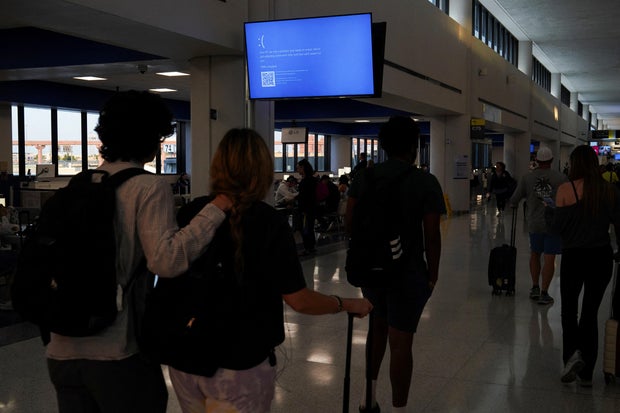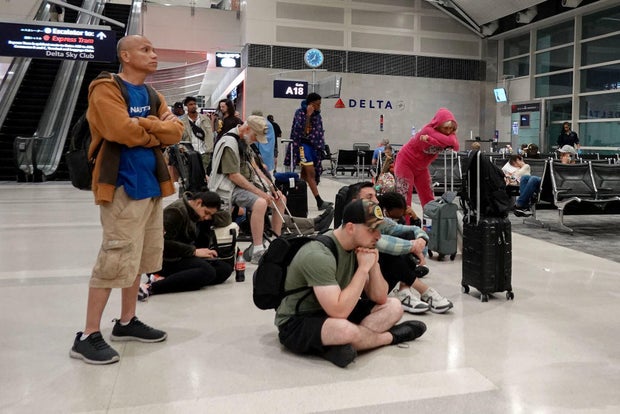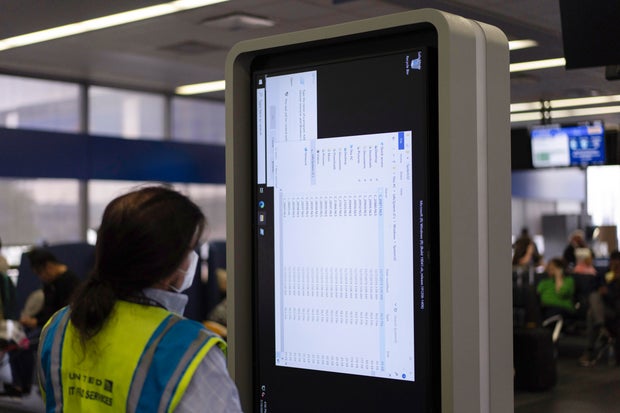Airlines, government and businesses rush to get back on track after global tech disruption

Transport providers, businesses, hospitals and governments on Saturday are rushing to get all their systems back online after long disruptions following a widespread technology outage.
The biggest continuing effect has been on air travel. Carriers canceled thousands of flights on Friday and now have many of their planes and crews in the wrong place, while airports facing continued problems with check-in and security. On Saturday around 10:30 p.m. EDT, flight-tracking service FlightAware listed more than 33,000 total flight delays on its website, and more than 2,700 cancellations.
Both American Airlines and United Airlines said Saturday that most of its operations were restored and back up and running.
At the heart of the massive disruption is CrowdStrike, a cybersecurity firm that provides software to scores of companies worldwide. The company says the problem occurred when it deployed a faulty update to computers running Microsoft Windows, noting that the issue behind the outage was not a security incident or cyberattack.
The Microsoft outage caused by the CrowdStrike software update also caused the return of a familiar — and dreaded — screen for many Windows users: what has come to be known informally as the “blue screen of death,” indicating that their computer systems are down.
Microsoft said 8.5 million devices running its Windows operating system were affected by the outage that affected consumers and businesses across the globe, including airlines, banks, health care providers, telecoms, retailers and even billboards in New York City’s Times Square.
In a blog post shared on Saturday morning, Microsoft said it engaged with CrowdStrike to automate work on developing a solution, sharing instructions on how to remedy the issue and deploying “hundreds of Microsoft engineers and experts to work directly with customers to restore services,” among other steps to keep people informed and help affected customers.
“We currently estimate that CrowdStrike’s update affected 8.5 million Windows devices, or less than one percent of all Windows machines,” said the blog post from Microsoft cybersecurity executive David Weston.
“While the percentage was small, the broad economic and societal impacts reflect the use of CrowdStrike by enterprises that run many critical services.”
Bing Guan / REUTERS
Here’s the latest:
Germany warns of scams after major IT outage
BERLIN — The German government’s IT security agency says numerous companies are still struggling with the consequences of a far-reaching technology outage.
“Many business processes and procedures have been disturbed by the breakdown of computer systems,” the BSI agency said on its website.
But the agency also said Saturday that many impacted areas have returned to normal.
It warned that cybercriminals were trying to take advantage of the situation through phishing, fake websites and other scams and that “unofficial” software code was in circulation.
The agency said it was not yet clear how faulty code ended up in the CrowdStrike software update blamed for triggering the outage.
Austrian doctors’ group calls for better data protection for patients
In Austria, a leading doctors organization said the global IT outage exposed the vulnerability of health systems reliant on digital systems.
“Yesterday’s incidents underscore how important it is for hospitals to have analogue backups” to safeguard patient care, Harald Mayer, vice president of the Austrian Chamber of Doctors, said in a statement on the organization’s website.
The organization called on governments to impose high standards in patient data protection and security and on health providers to train staff and put systems in place to manage crises.
“Happily, where there were problems, these were kept small and short-lived and many areas of care were unaffected” in Austria, Mayer said.
Britain’s transport system still trying to get back on track
LONDON — Britain’s travel and transport industries are struggling to get back on schedule after the global security outage with airline passengers facing cancellations and delays on the first day of the summer holidays for many school pupils.
Gatwick Airport said “a majority” of scheduled flights were expected to take off. Manchester Airport said passengers were being checked in manually and there could be last-minute cancellations.
The Port of Dover said it was seeing an influx of displaced air passengers, with hourlong waits to enter the port to catch ferries to France.
Meanwhile, Britain’s National Cyber Security Center warned people and businesses to be on the lookout for phishing attempts as “opportunistic malicious actors” try to take advantage of the outage.
The National Cyber Security Center’s former head, Ciaran Martin, said the worst of the crisis was over, “because the nature of the crisis is that it went very wrong very quickly. It was spotted quite quickly and essentially it was turned off.”
He told Sky News that some businesses would be able to get back to normal very quickly, but for sectors such as aviation, it would take longer.
“If you’re in aviation, you’ve got people, planes and staffs all stranded in the wrong place… So we are looking at days. I’d be surprised if we’re looking at weeks.”
European airports appear to be close to normal
LONDON — Europe’s busiest airport, Heathrow, said it is busy but operating normally on Saturday. The airport said in a statement that “all systems are back up and running and passengers are getting on with their journeys smoothly.”
Some 167 flights scheduled to depart from U.K. airports on Friday were canceled, while 171 flights due to land were axed.
Meanwhile, flights at Berlin Airport were departing on or close to schedule, German news agency dpa reported, citing an airport spokesman.
Nineteen flights took off in the early hours of Saturday after authorities exempted them from the usual ban on night flights.
On Friday, 150 of the 552 scheduled inbound and outbound flights at the airport were canceled over the IT outage, disrupting the plans of thousands of passengers at the start of the summer vacation season in the German capital.
Delta Air Lines and its regional affiliates have canceled hundreds of flights
DALLAS — Delta Air Lines and its regional affiliates canceled more than a quarter of their schedule on the East Coast by midafternoon Friday, aviation data provider Cirium said.
More than 1,100 flights for Delta and its affiliates have been canceled. About 40% of the airline’s mainline flights were delayed as of Saturday afternoon, with another 25% canceled. About 40% of regional flights have been canceled, per FlightAware, with Georgia’s Hartsfield–Jackson Atlanta International Airport remaining the epicenter of the disruption.
About half of United Airlines’ flights were delayed as of Saturday afternoon, with another 15% canceled. The airline’s hub airport in Houston is seeing the worst of the delays.
American Airlines’ network had canceled 450 flights, 7.5% of its schedule, and is viewing Saturday as a recovery day.
Southwest and Alaska do not use the CrowdStrike software that led to the global internet outages and had canceled fewer than a half-dozen flights each.
Getty Images
How healthcare systems are coping
Health care systems affected by the outage faced clinic closures, canceled surgeries and appointments and restricted access to patient records.
Cedars-Sinai Medical Center in Los Angeles said “steady progress has been made” to bring its servers back online and thanked its patients for being flexible during the crisis.
“Our teams will be working actively through the weekend as we continue to resolve remaining issues in preparation for the start of the work week,” the hospital wrote in a statement.
In Austria, a leading organization of doctors said the outage exposed the vulnerability of relying on digital systems. Harald Mayer, vice president of the Austrian Chamber of Doctors, said the outage showed that hospitals need to have analog backups to protect patient care.
The organization also called on governments to impose high standards in patient data protection and security, and on health providers to train staff and put systems in place to manage crises.
“Happily, where there were problems, these were kept small and short-lived and many areas of care were unaffected” in Austria, Mayer said.
The Schleswig-Holstein University Hospital in northern Germany, which canceled all elective procedures Friday, said Saturday that systems were gradually being restored and that elective surgery could resume by Monday.
Mayor of Portland, Oregon, declares an emergency over the outage
PORTLAND, Ore. — Mayor Ted Wheeler declared an emergency Friday after more than half of the city’s computer systems were affected by the global internet outage.
Wheeler said during a news conference that while emergency services calls weren’t interrupted, dispatchers were having to manually track 911 calls with pen and paper for a few hours. He said 266 of the city’s 487 computer systems were affected.
Border crossings into the U.S. are delayed
SAN DIEGO — People seeking to enter the U.S. from both the north and the south found that the border crossings were delayed by the internet outage.
The San Ysidro Port of Entry was gridlocked Friday morning with pedestrians waiting three hours to cross, according to the San Diego Union-Tribune.
Even cars with people approved for a U.S. Customers and Border Protection “Trusted Traveler” program for low-risk passengers waited up to 90 minutes. The program, known as SENTRI, moves passengers more quickly through customs and passport control if they make an appointment for an interview and submit to a background check to travel through customs and passport control more quickly when they arrive in the U.S.
Meanwhile, at the U.S.-Canada border, Windsor Police reported long delays at the crossings at the Ambassador Bridge and the Detroit-Windsor tunnel.
Carolyn Kaster / AP
Related
EU denies picking on US tech giants, says US also…
BRUSSELS (Reuters) - Europe's new tech rule aims to keep digital markets
H-1B Visa 2025: How and why US policy shift may…
Recent changes in US H-1B visa policies have sparked significant concern within the Indian IT professional community hoping to work in America. However, the a
Alibaba Group (BABA) Stock: Chinese Tech Giants Gain $439 Billion…
Chinese tech stocks have gained over 40% this year, adding $439 billion in valueChina’s “7 titans” are outperforming the US “Magnificent Seven” tech s
The Global Spread of Protectionist Policies That Squeeze American Tech…
An increasing number of countries in recent years have begun targeting America’s leading technology firms with policies touted as measures to promote fair com
















